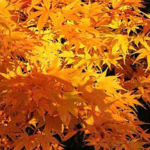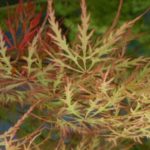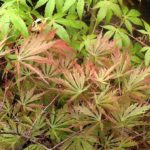- Literally a tree, originally grown in Japan …. Not very helpful !
- technically.. Asiatic varieties of “acer palmatum ,acer japonicum “
- there are at least 250 named varieties . I would like to encourage the readers to go on and research the ones they like and start with J.D.Vertrees
- All the members of the family are deciduous, the leaves fall off in the winter
- they are shallow rooted and will readily transplant during the dormant season
- they are not restricted by soil or weather conditions. there are maples for full sun or deep shade… in saying this, to get the best out of several cultivars, leaves with variegations you will get the best results if they are grown in the most appropriate positions
- all have a shallow fibrous root system
- the planting site must not be either very dry or very wet . but anything in between is acceptable a uniform supply is ideal
- T.B.C.
- THERE IS ROOM FOR A JAPANESE MAPLE IN ANY GARDEN OR ON ANY PATIO IN A CONTAINER ….They are all easy to look after, only need maintenance pruning Very hardy and have spectacular leaf colour changes throughout the year they range from small shrubs to medium-sized trees and most can be trimmed to any size in between, most make good Bonsai subjects .
- On this page i will try to ….extrapolate (this is the last time i am going to use a word we need to look up ) from the statement…. Japanese Maples…. inform what you get for your money. Personally I pick up more from pictures ,than words
some pictures …. “Acer palmatum” Japanese Maples




acer palmatunm “Deshojo” some seedlings will display this leaf form, and as we have said before, all forms were derived from seed originally, but we cannot call them “Deshojo” i will try to expand this later
Below are varieties of “Acer palmatum” Japanese Maples
they are divided into seven groups/types mainly distinguished by leaf form. I will list them all, they all differ but my main interest is with with numbers 1.2.3.5. I think most of our seedlings will fall into these leaf forms but growing from seed you never know what you might get
- Palmatum…. leaves with serrated edges, five or seven lobes generally divided from the tip more then half way to the base .having sharp tip. With smallish leaves
- Amoenum… leaves with finer serrations ,seven lobes with less pronounced divisions
- Matsumurae…. leaves larger with course serrations and more pronounced seven/ nine lobe divisions (this is the leaf we use as a logo)
- Linearilobum.. leaves almost divided from tip to base
- Dissectum……. leaves deeply divided and heavily serrated, lace like appearance
- Dwarf …… these trees whose height when fully mature will not be taller than 2 meters
- there are others

Hmm it seems like your blog ate my first comment (it was extremely long) so I guess I’ll just sum it up what I
wrote and say, I’m thoroughly enjoying your blog.
I too am an aspiring blog blogger but I’m still new to everything.
Do you have any tips and hints for first-time
blog writers? I’d certainly appreciate it.
If you are not passionate about what you are writing about . DONT
Heya i am just for the first time here. I found this board and that i find It really useful & it helped
me to out much. I really hope to present something back and help others as if you aided me.
I intend writing more ,,,,,when time will allow